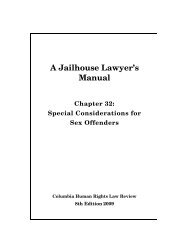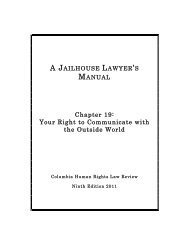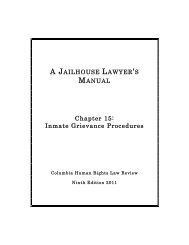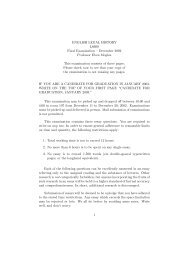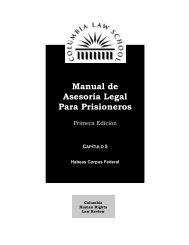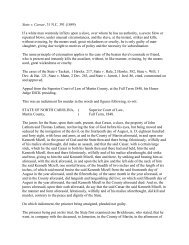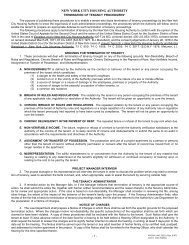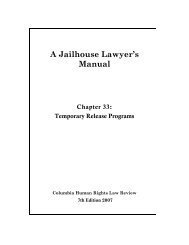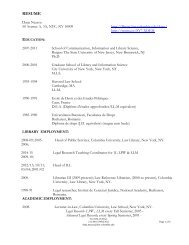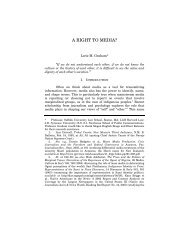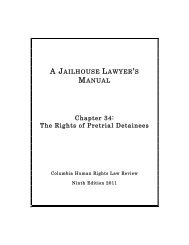The Right to Dignity Rex D. Glensy - Columbia Law School
The Right to Dignity Rex D. Glensy - Columbia Law School
The Right to Dignity Rex D. Glensy - Columbia Law School
Create successful ePaper yourself
Turn your PDF publications into a flip-book with our unique Google optimized e-Paper software.
2011] <strong>The</strong> <strong>Right</strong> <strong>to</strong> <strong>Dignity</strong> 131<br />
the individual, as AfricanAmerican schoolchildren and patrons of<br />
public accommodations could not have the essence of their<br />
personhood stripped away with government imprimatur or, at the<br />
minimum, government acquiescence. 301 It was the inherent indignity<br />
of having <strong>to</strong> be placed in substandard schools or being turned away at<br />
an inn that motivated the equal protection analysis in both of these<br />
seminal cases. 302 Not all American laws are cryptic in tying the right<br />
<strong>to</strong> equal treatment <strong>to</strong> the right <strong>to</strong> dignity. In fact, some American<br />
laws expressly codify the notion of human dignity as equal protection.<br />
<strong>The</strong> constitutions of Montana, 303 Louisiana, 304 Illinois, 305 and Puer<strong>to</strong><br />
Rico, 306 all in slightly different ways, link their own equal protection<br />
clauses (or a subsection of their equal protection clauses) <strong>to</strong> dignity.<br />
While courts in the United States have been more reticent <strong>to</strong><br />
openly draw the parallel between equality and dignity, other courts<br />
301. Brown v. Bd. of Educ., 347 U.S. 483 (1954); Heart of Atlanta Motel v.<br />
United States, 379 U.S. 241 (1965).<br />
302. William Parent advances the same thesis: “I am suggesting that in<br />
these segregation cases members of our highest court displayed a genuine concern<br />
for the value of human dignity.” Parent, supra note 130, at 59.<br />
303. Individual <strong>Dignity</strong>. <strong>The</strong> dignity of the human being is<br />
inviolable. No person shall be denied the equal protection of the<br />
laws. Neither the state nor any person, firm, corporation or<br />
institution shall discriminate against any person in the exercise<br />
of his civil or political rights on account of race, color, sex,<br />
culture, social origin or condition, or political or religious ideas.<br />
Mont. Const. art. II, § 4.<br />
304. “<strong>Right</strong> <strong>to</strong> Individual <strong>Dignity</strong>. No person shall be denied the equal<br />
protection of the laws. No law shall discriminate against a person because of race<br />
or religious ideas, beliefs or affiliations.” La. Const. art. I, § 3.<br />
305. “Individual <strong>Dignity</strong>. To promote individual dignity, communications<br />
that portray criminality, depravity or lack of virtue in, or that incite violence,<br />
hatred, abuse or hostility <strong>to</strong>ward, a person or group of persons by reason of or by<br />
reference <strong>to</strong> religious, racial, ethnic, national or regional affiliation are<br />
condemned.” Ill. Const. art. 1, § 20. <strong>The</strong> intersection between equality, dignity,<br />
and the prohibition of hate speech is interesting. It is quite probable that the<br />
proscriptions on hate speech rely on an intersection of protecting human dignity<br />
and equality seeing that the categories of people protected from such vilification<br />
are those traditionally associated with antidiscrimination safeguards such as race<br />
and gender. See Mari J. Matsuda, Public Response <strong>to</strong> Racist Speech: Considering<br />
the Victim’s S<strong>to</strong>ry, 87 Mich. L. Rev. 2320, 2323 (1989) (tying the targeting of hate<br />
speech <strong>to</strong> antidiscrimination norms); Daniel Statman, Two Concepts of <strong>Dignity</strong>, 24<br />
Tel Aviv U. L. Rev. 541, 577 (2001) (linking dignity and gender discrimination).<br />
306. “<strong>The</strong> dignity of the human being is inviolable. All men are equal before<br />
the law. No discrimination shall be made on account of race, color, sex, birth,<br />
social origin or condition, or political or religious ideas.” Puer<strong>to</strong> Rico Const. art.<br />
11, § 1.



